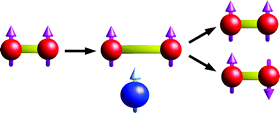Mechanism of nuclear spin initiated para-H2 to ortho-H2 conversion
Abstract
In this paper a quantitative explanation for a diamagnetic ortho/para H2 conversion is given. The description is based on the quantum-mechanical density matrix formalism originally developed by Alexander and Binsch for studies of exchange processes in NMR spectra. Only the nuclear spin system is treated quantum-mechanically. Employing the model of a three spin system, the reactions of the hydrogen gas with the catalysts are treated as a phenomenological rate process, described by a rate constant. Numerical calculations reveal that for nearly all possible geometrical arrangements of the three spin system an efficient spin conversion is obtained. Only in the chemically improbable case of a linear group H–X–H no spin conversion is obtained. The efficiency of the spin conversion depends strongly on the lifetime of the H–X–H complex and on the presence of exchange interactions between the two hydrogens. Even moderate exchange couplings cause a quench of the spin conversion. Thus a sufficiently strong binding of the dihydrogen to the S spin is necessary to render the quenching by the exchange interaction ineffective.


 Please wait while we load your content...
Please wait while we load your content...